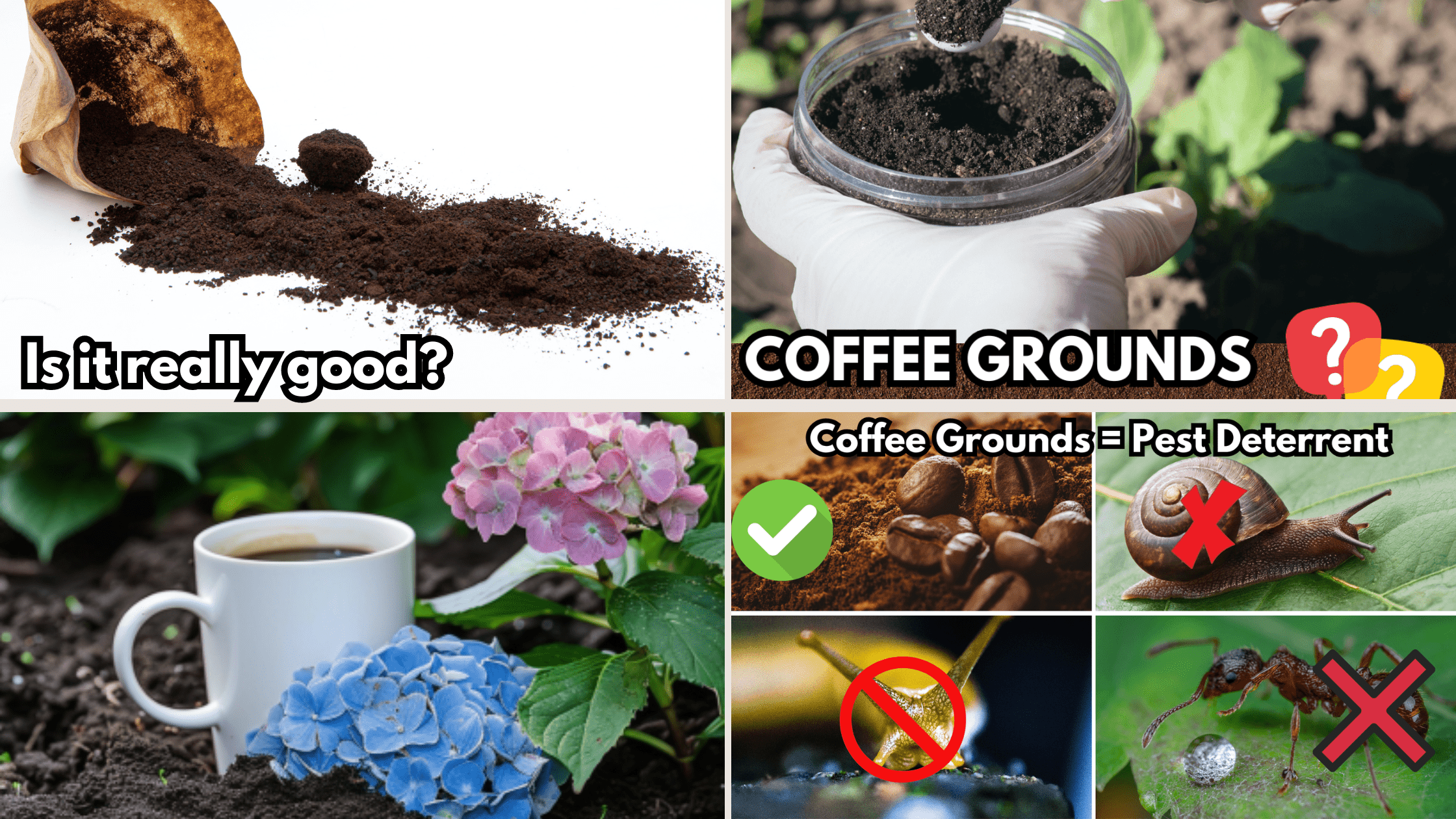Benefits of Using Coffee Grounds in the Garden
Enrich Your Soil
By adding your coffee grounds to your garden soil, your soil structure and fertility will be improved. Used coffee grounds are also rich in nitrogen, which makes them a fertiliser powerhouse for your plants.
They can attract earthworms, essential for garden health, fostering a thriving ecosystem.
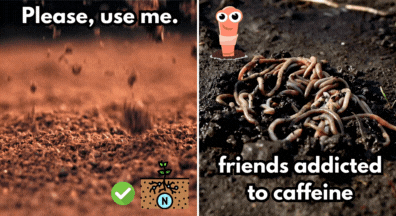
Natural Pest Deterrent
Coffee grounds are also a good way to ward off garden pests such as slugs, snails and even ants. Sprinkle grounds around beds and trees and they’ll stop by less often.
If a snail crawls over coffee grounds, do they go a little faster?
🤔 If a snail cruises over some coffee grounds, do they get a little speed boost? 🐌☕🚀
How to Use Coffee Grounds in the Garden
1. Direct Application to Soil
How to Put Coffee Grounds in Garden Soil
Just sprinkle used coffee grounds on top of your soil. This adds organic matter directly in the soil to help retain moisture and improve your soil structure over time.
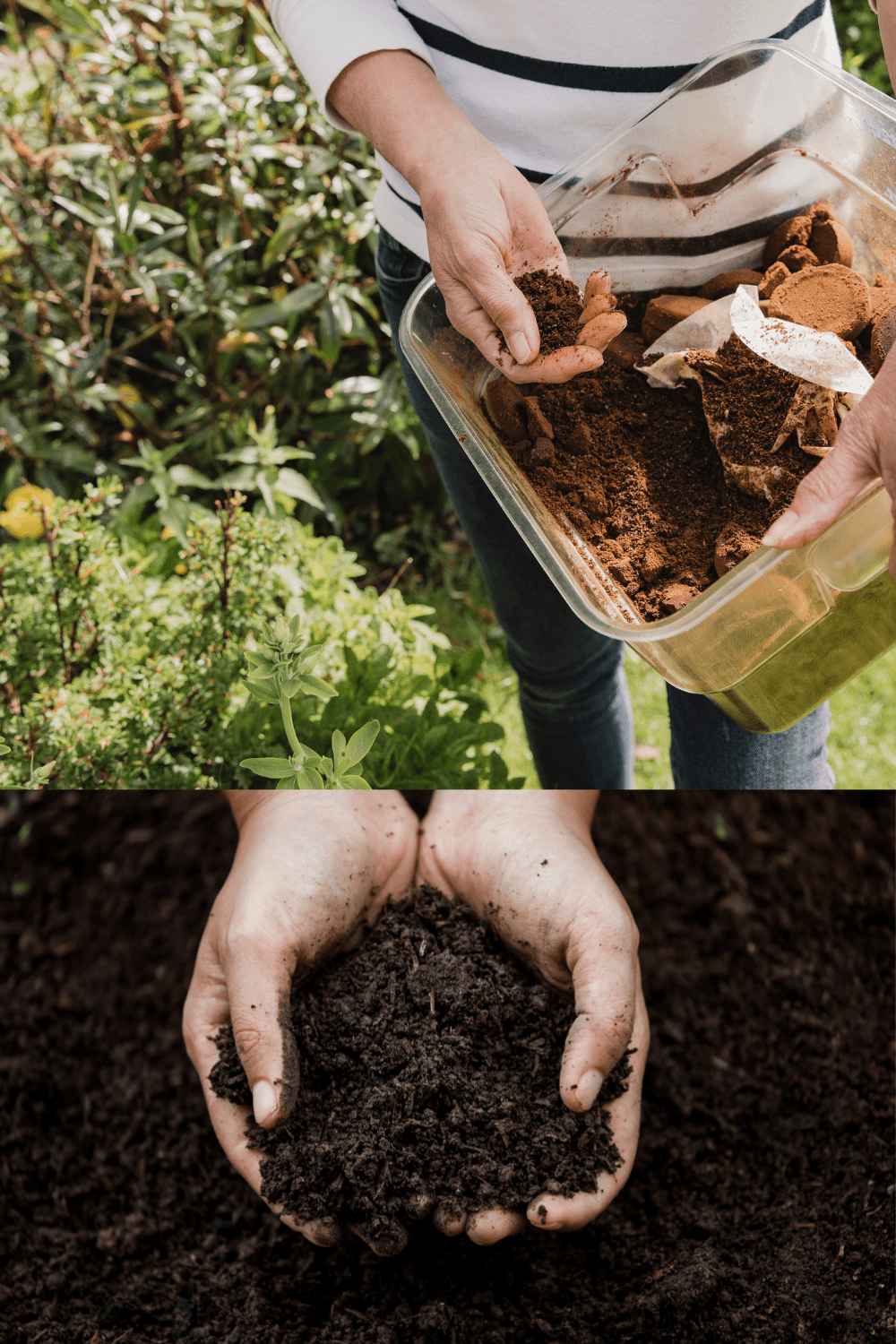
2. Creating a Coffee Grounds Compost
Coffee Grounds in the Garden: How to Use Them for Compost
For a balanced mix, toss some coffee grounds into your compost pile. Coffee grounds are a ‘green’ compost material (meaning they’re full of nitrogen), so pair them with ‘brown’ materials such as leaves, sawdust or straw to help create compost.
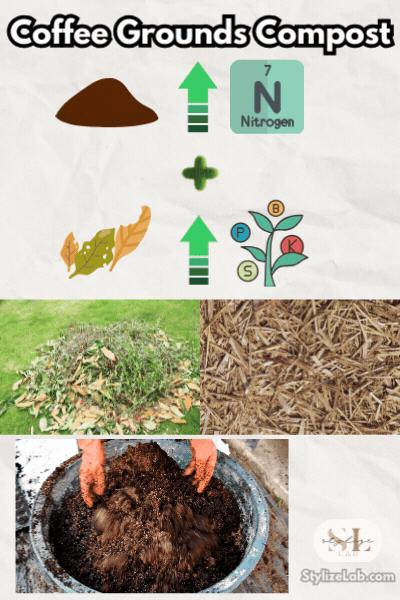
3. Fertilizing Your Vegetable Garden
Coffee Grounds for Vegetable Garden Growth
These are good for vegetable gardens: worked into the soil they add nitrogen for tomatoes in particular, but also leafy greens.
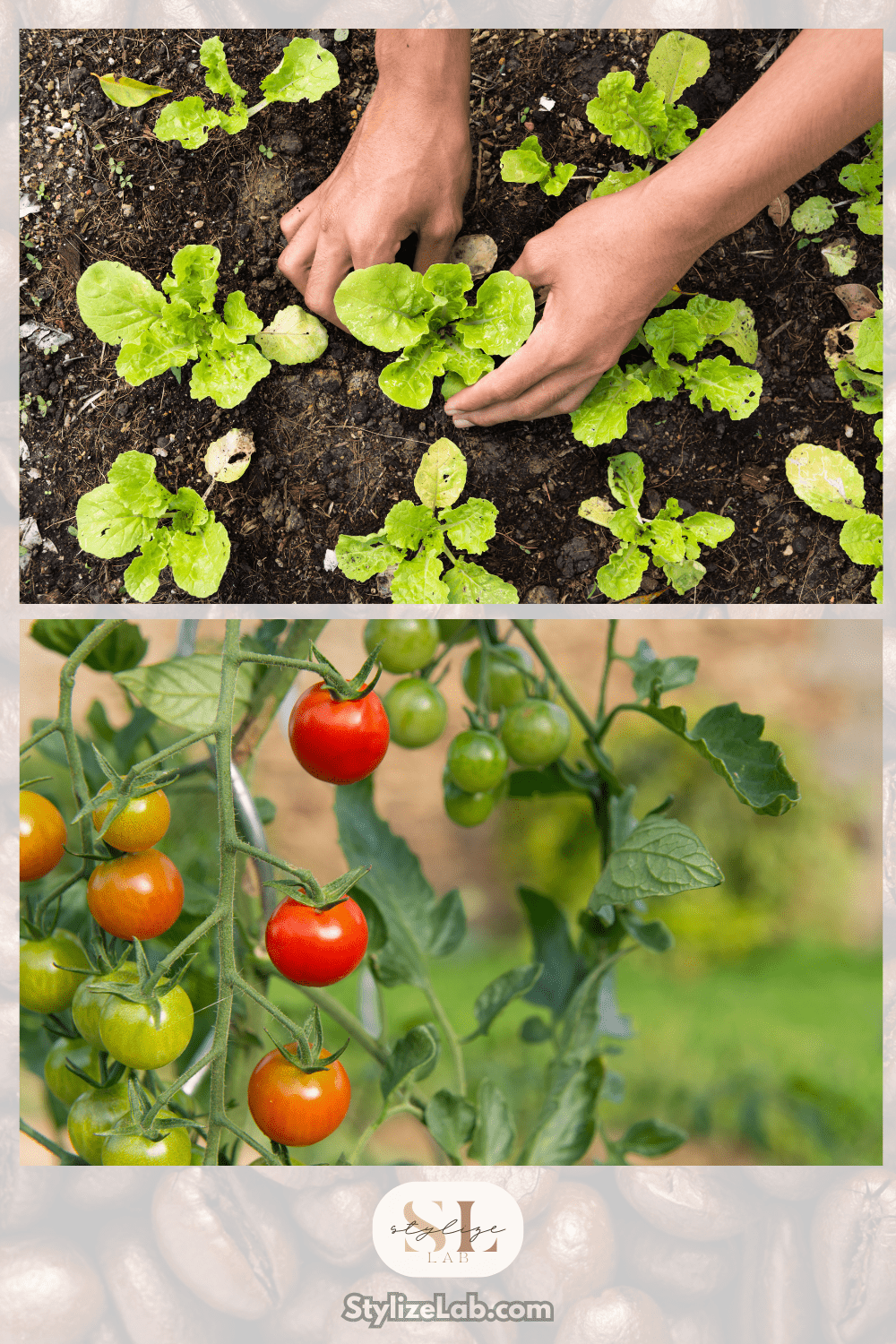
4. Boosting Flowering Plants
Coffee Grounds in the Garden: Hydrangeas and Other Flowers
Add colour and growth to acid-loving plants, such as hydrangeas. Blend coffee grounds into the soil around flowers to produce brilliant and colourful blooms.
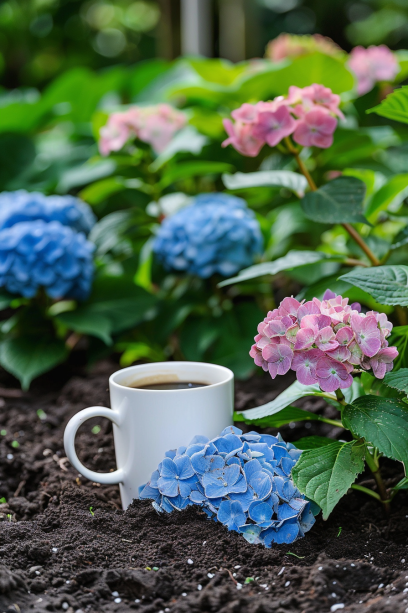
It’s amazing how you can have beautiful half pink and half blue blooms just by spreading out some coffee grounds.
5. Mulching with Coffee Grounds
How and Where to Put Coffee Grounds in Garden As Mulch
Use it as a finely textured mulch: spread the grounds in a thin layer around the plants to discourage weeds and help your soil hold moisture.
When to Use Coffee Grounds in the Garden
You can incorporate coffee grounds into your garden at any time of year, but early spring is a good season to do so, as this is when most plants would be starting their growing season and would be able to make the most use of the additional nutrients added to the soil.
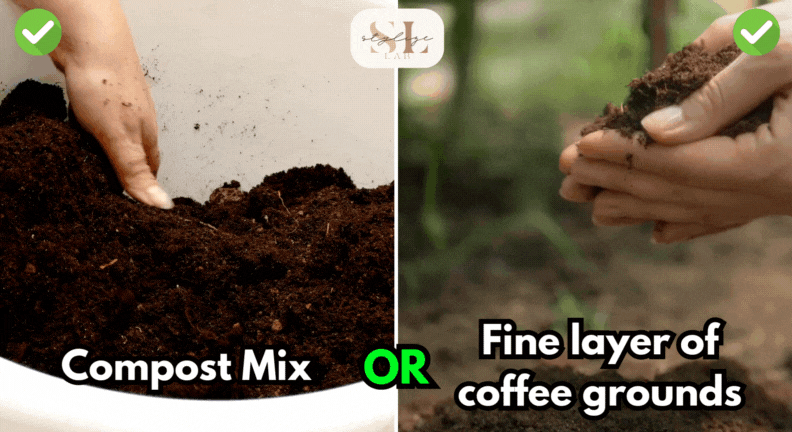
Tips for Using Coffee Grounds in the Garden
- Acidity Awareness: Coffee grounds are slightly acidic, and acidity is important for many plants, but it’s best to not overdo it. Add only a thin layer, or mix them in with your other compost materials.
- Avoid Uncomposted Grounds: Fresh, uncomposted coffee grounds can inhibit growth. Used grounds or compost them before application.
Coffee Grounds for Pest Control
Repelling Pests
The abrasive texture of the coffee grounds can deter soft-bodied pests such as slugs and snails. Coffee, used as a barrier, is often advocated as a natural deterrent for garden pests.
Further, the intense smell of coffee could work to repel other pests such as ants and even certain mammals, such as cats.
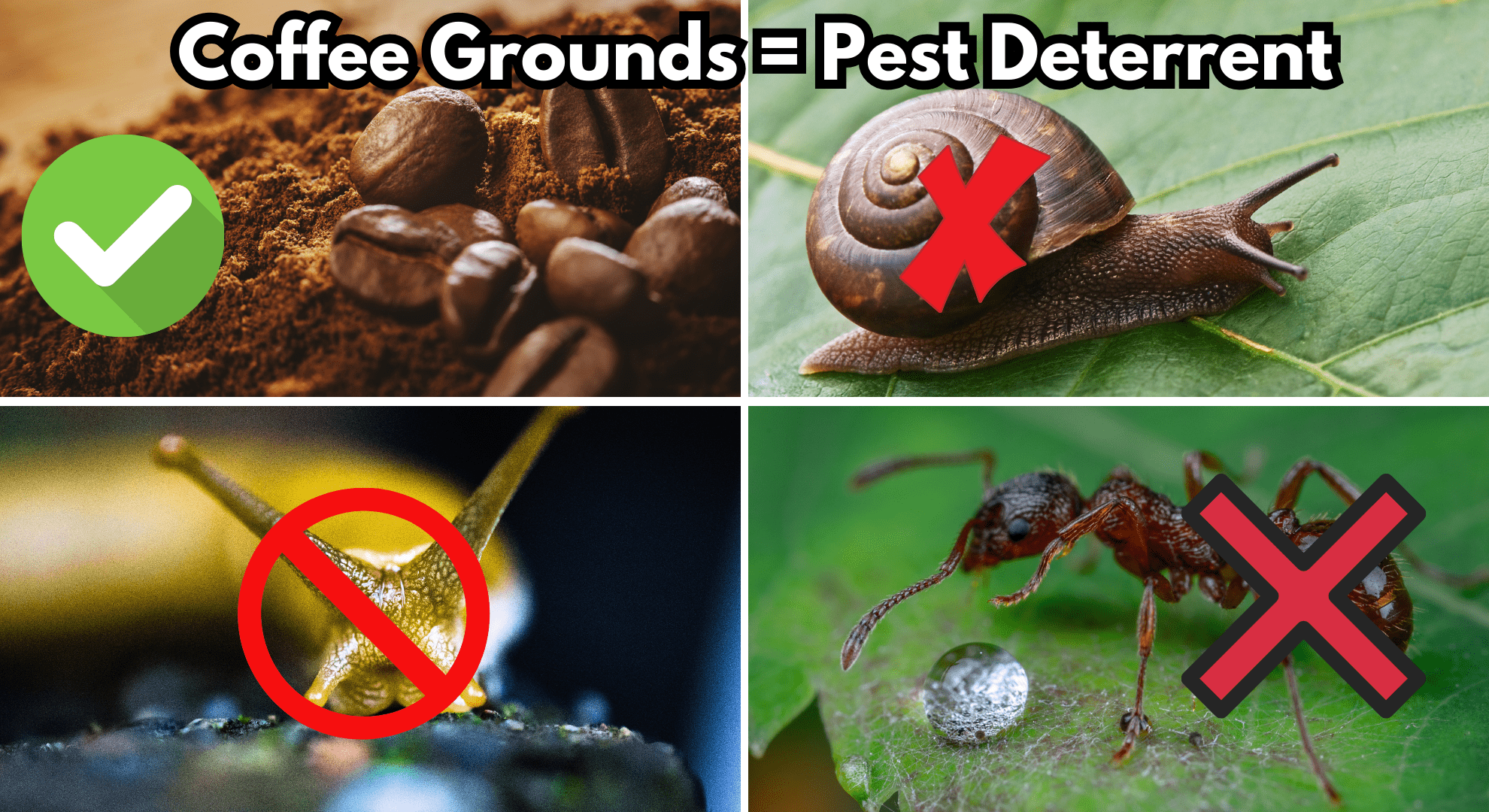
- Slugs and Snails: Coffee grounds are a rough, gritty substance that snails and slugs don’t like to crawl on, and coffee grounds sprinkled on the plant’s soil will keep these creatures away.
- Ants: The smell can disrupt ants’ scent trails and be a natural repellent.
(Extra) Cats can be avoided too: Coffee grounds are supposed to deter cats from using your garden beds, apparently they don’t like it under their paws.🐱
Effectiveness
The effectiveness of coffee grounds as a pest deterrent is a topic of debate. Here’s a straightforward look at what is known:
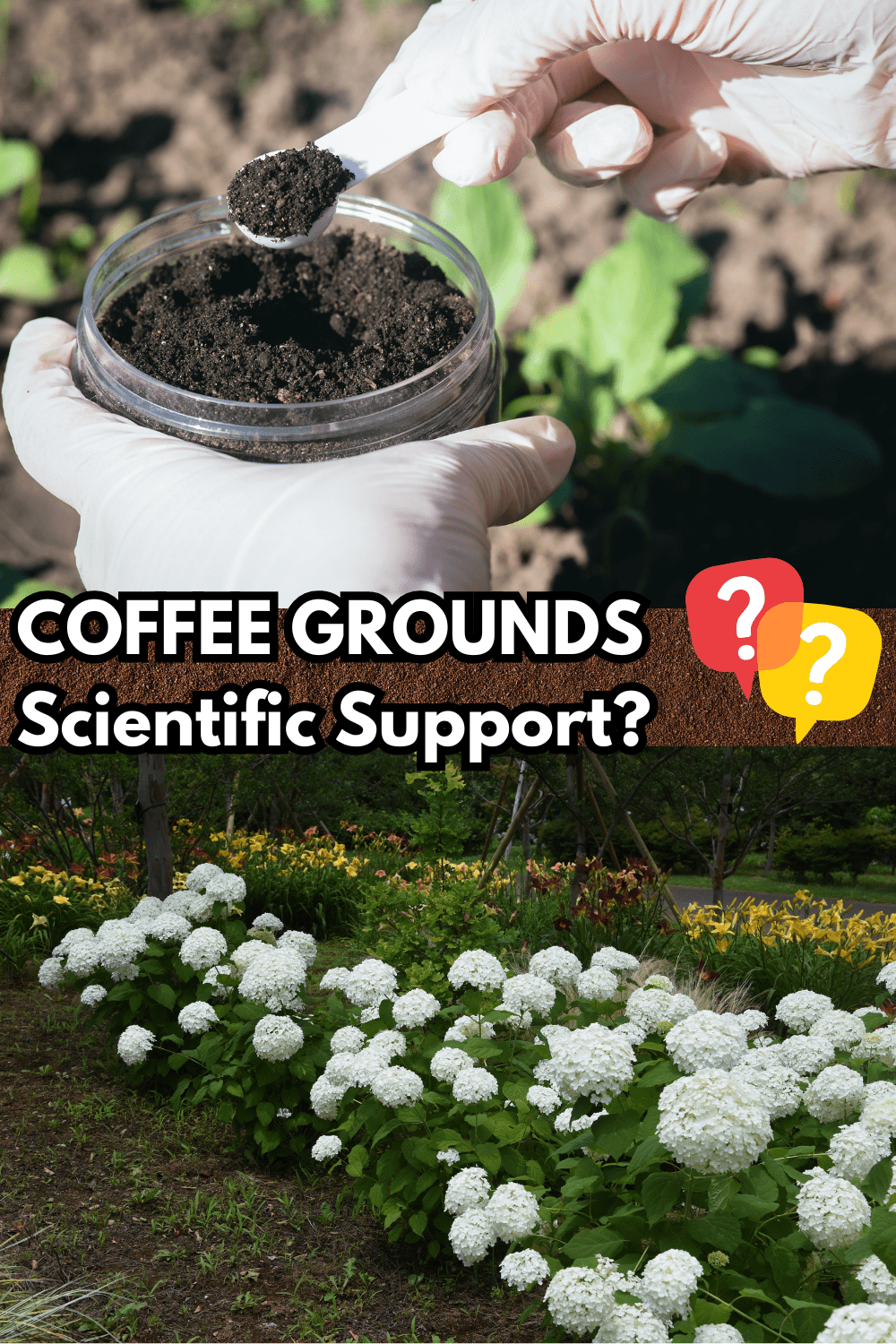
- Scientific support: There have been some scientific studies, but we are unfortunately no closer to consensus. For example, caffeine can be toxic to slugs and snails, but the concentrations in used coffee grounds might be too low to be lethal.
- Informal Evidence: I have heard from numerous gardeners who say that coffee grounds form a small part of their pest management strategy, and that they experience fewer issues with slugs, snails and ants in areas where they apply coffee grounds most often.
- Practical Tips: Sprinkle a thin layer of grounds at the base of plants. Reapply after rain or watering, as the grounds will leach away or lose their acidity.
🧑🔬 Although there’s thin scientific evidence for the effectiveness of coffee grounds as a deterrent against pests, gardeners (I am) appear to be convinced that they make useful and natural weapons in the battle against plant-destroying insects.
Coffee grounds might be worth a try for folk who want to reduce garden vermin as much as possible. 😌
Enhancing Soil Acidity
Acid-Loving Plants
Some plants like neutral-to-acid soil, and so using your coffee grounds as a natural amendment for them is a good idea. Here are some acid-loving plants:
- Blueberries: These fruits need acidic soil with a pH between 4.5 ~ 5.5 to flourish.
- Azaleas: These flowering shrubs perform best in soil with a pH of 4.5 to 6.0.
- Rhododendrons: Closely related to azaleas, these plants also prefer acidic soil.
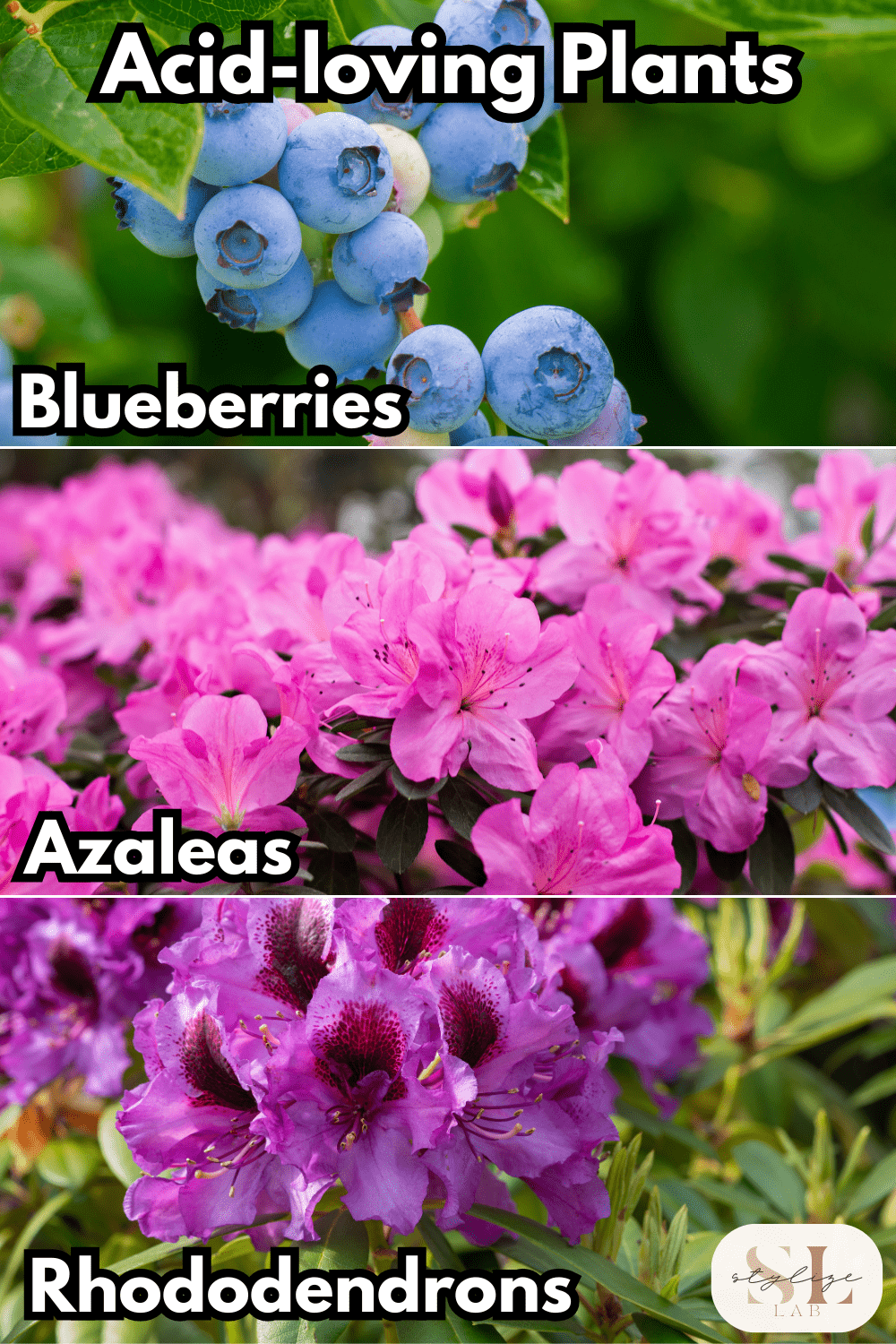
- Roses: While not as sensitive as some other acid-loving plants, roses can benefit from slightly acidic soil.
- Hollies: These evergreen shrubs favor acidic soil for optimal growth.
- Camellias: These produce beautiful blooms and thrive in acidic conditions.
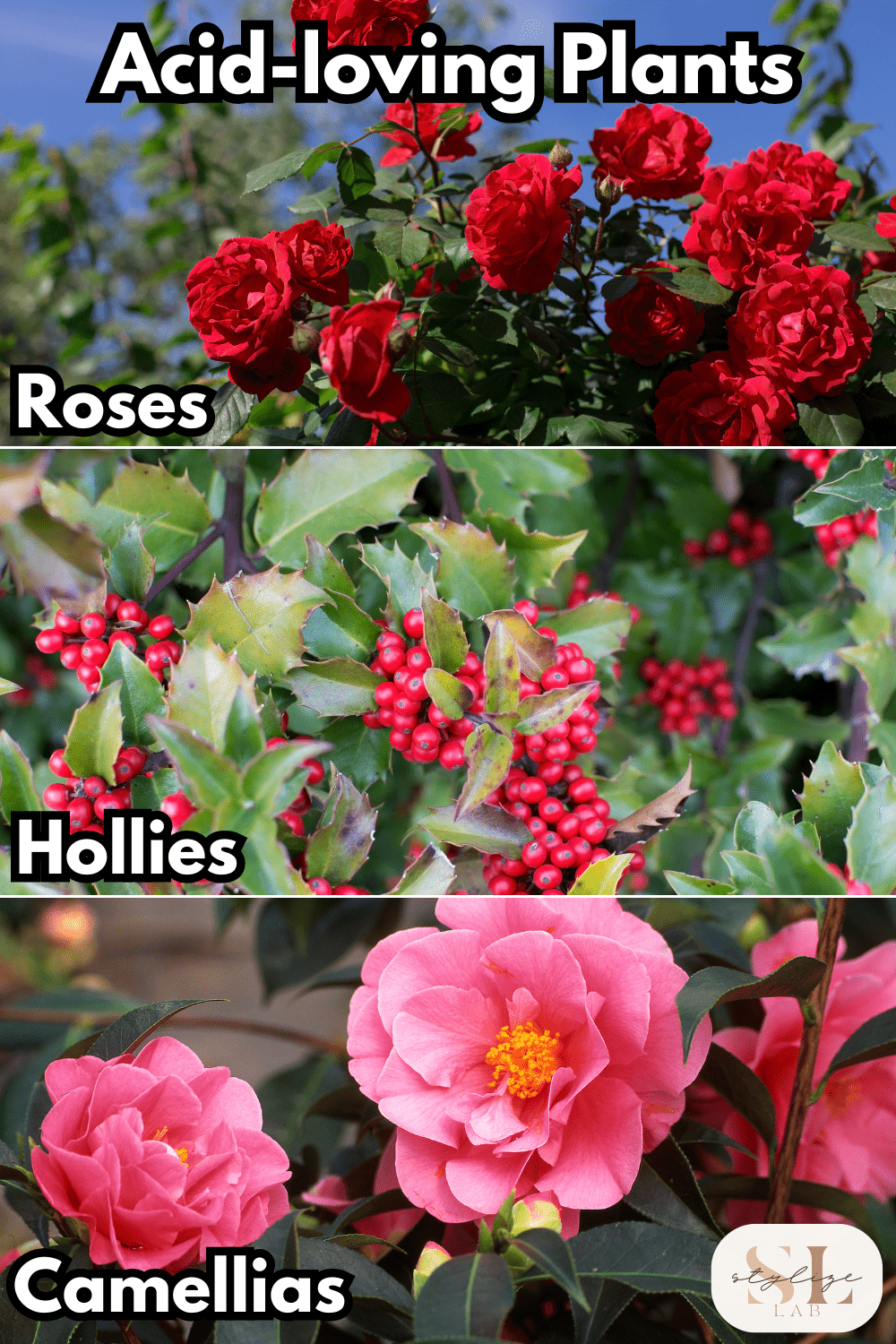
Application Rates
While I encourage people to continue using their spent coffee grounds to fertilise their soil, it should be done judiciously to avoid the danger of over-acidification and plant toxicity. Follow these guidelines:
- Moderation is Critical: Use coffee grounds moderately. A thin layer spread over the soil surface, around half an inch thick, will be about right.
- Mix with other materials: mix them with other organic materials such as leaf mold, compost or mulch to dilute their acidity.
- Frequency: Apply every 1 to 2 months during the growing season. Check your soil pH frequently (you can test it with a simple pH testing kit) to ensure pH is within the ideal range for your plants.
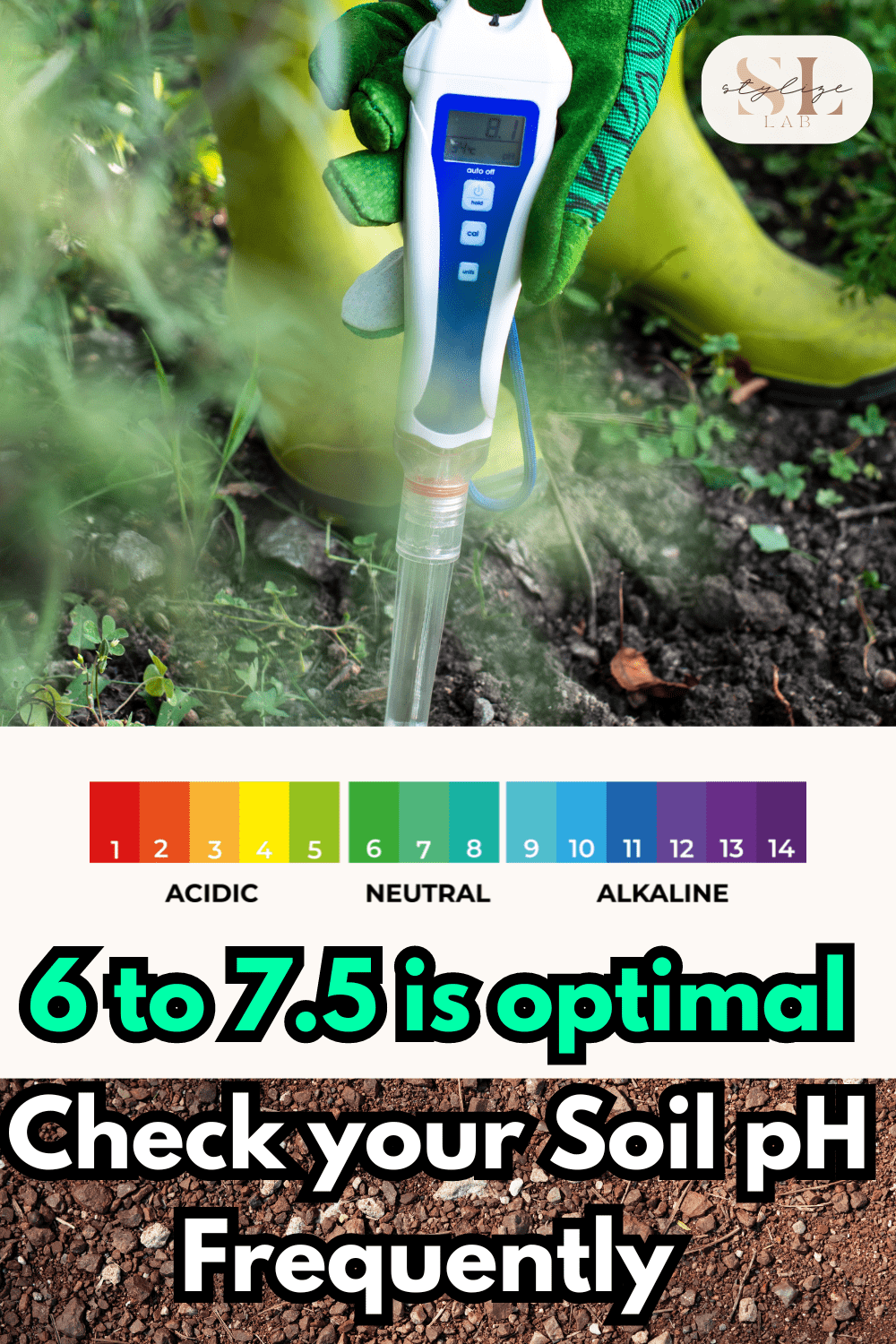
Coffee Grounds for Worms
Worm Composting
Adding coffee grounds to worm bins can be highly beneficial. Here’s how it works:
- Organic Matter: Coffee grounds are a great source of organic matter that worms can quickly digest.
- Texture: will help increase aeration and reduce the chance that the worm bin will get too compacted, for better decomposition.
Worm Health
Coffee grounds play a crucial role in enhancing the health and efficiency of your worm composting system:
- Magnet for Worms: The grounds act to attract worms, thus concentrating them to speed up the degradation of organic matter.
- Nutritional Bonus: Since a portion of each coffee bean is composed of nitrogen, using coffee grounds in your compost bin provides your worms with an essential, protein-like nutrient that helps them to digest food and stay healthy.
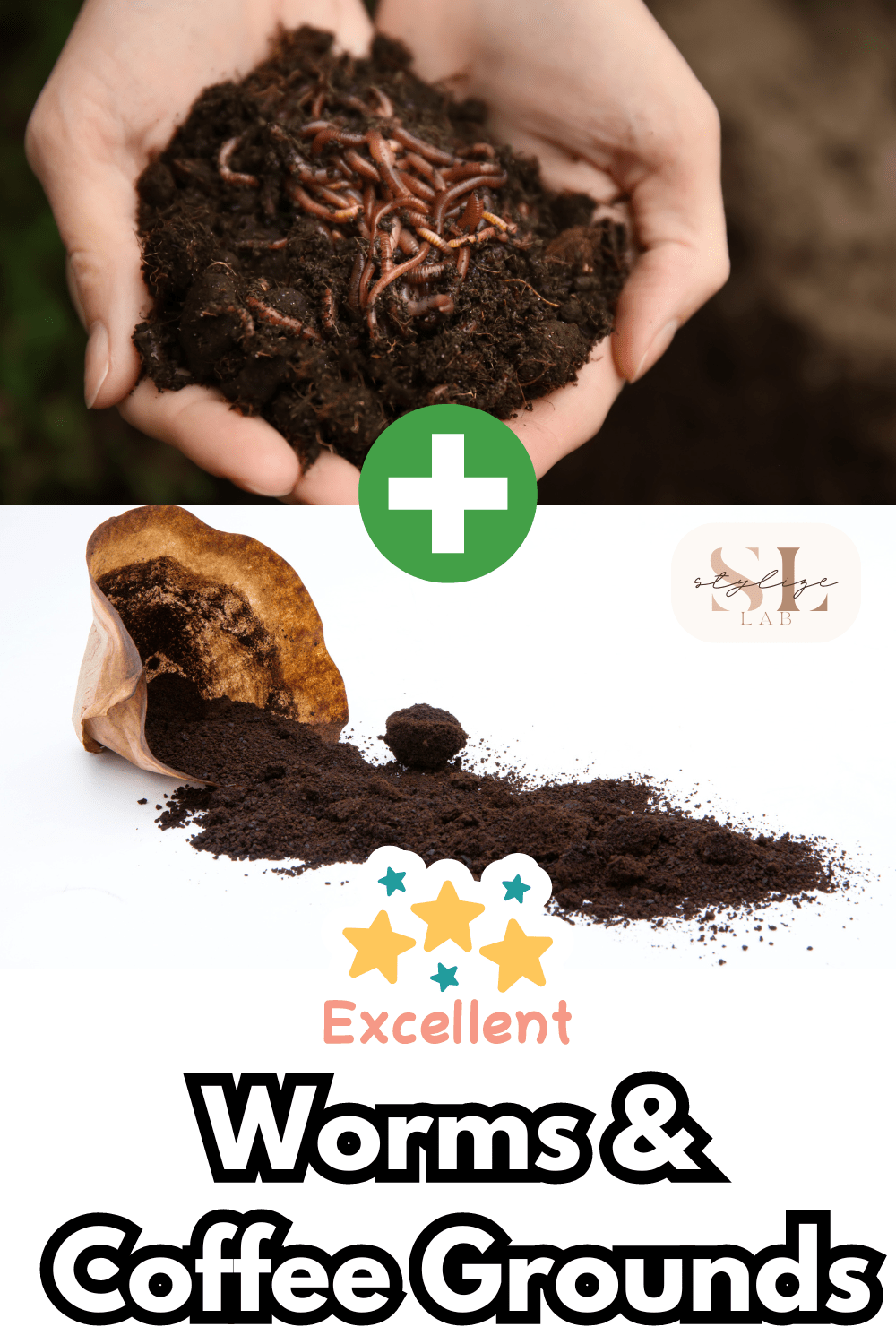
- Balance: It is important to balance out the amount of coffee grounds given to the worms with other organic waste, so that their diet is not too homogenous for them. If you feed them coffee grounds only, it could be too acidic for them.
Practical Tips for Adding Coffee Grounds to Worm Bins 🪱🪱
- First, Start Small: Mix a little, a ‘handful’ even, of coffee grounds in with your current kitchen bin contents.
- Stir ’em Up: Make sure the grounds are spread around so they’re mixed in with other decomposition materials such as paper, vegetable scraps and egg shells.
- Don’t Use Too Much: Your compost could become too acidic if too many grounds are introduced. Try to limit coffee grounds to 20% or less of the total worm bin content.
Common Misconceptions
Myth Busting
When it comes to using coffee grounds in gardening, several misconceptions prevail. Let’s address and correct some of the most common myths:
- Too acidic: One myth is that coffee grounds are too acidic to be used generally – but the actual pH of used coffee grounds falls between 6.5 and usually 6.8, which is pretty neutral and compatible with most plants. Fresh coffee grounds before brewing are much more acidic, but are not used in gardening.
- Fertiliser Substitute: Some believe coffee grounds can be used to replace complete fertiliser. The grounds do contain nutrients like nitrogen, potassium and phosphorus, but they do not contain a balanced nutrient profile and should not be used to replace a full-spectrum fertiliser.
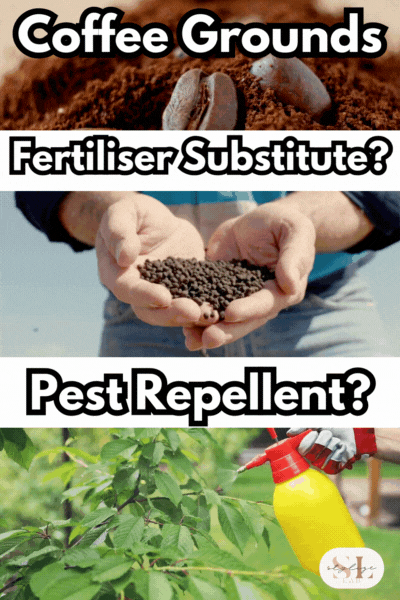
- Universal Pest Repellent🐌: Coffee grounds might keep some pests out, but they are far from a universal repellent, and their effectiveness will depend on the organism and the environmental context.
Potential Risks
Caffeine Content
The caffeine content in used coffee grounds can have both positive and negative effects:
- Plant health: Caffeine is a natural herbivore repellent that can put off from insect pests to slugs. But as a stimulant, caffeine can also work as a growth retardant at higher concentrations. While coffee grounds used in compost rank low on the caffeine scale, large amounts could cause problems for especially caffeine-sensitive plants.
- Microbes: If too caffeine makes its way into the soil, it could alter microbial populations (some microbes are inhibited by caffeine, and are important in decomposing waste and cycling nutrients). Best not to go overboard.
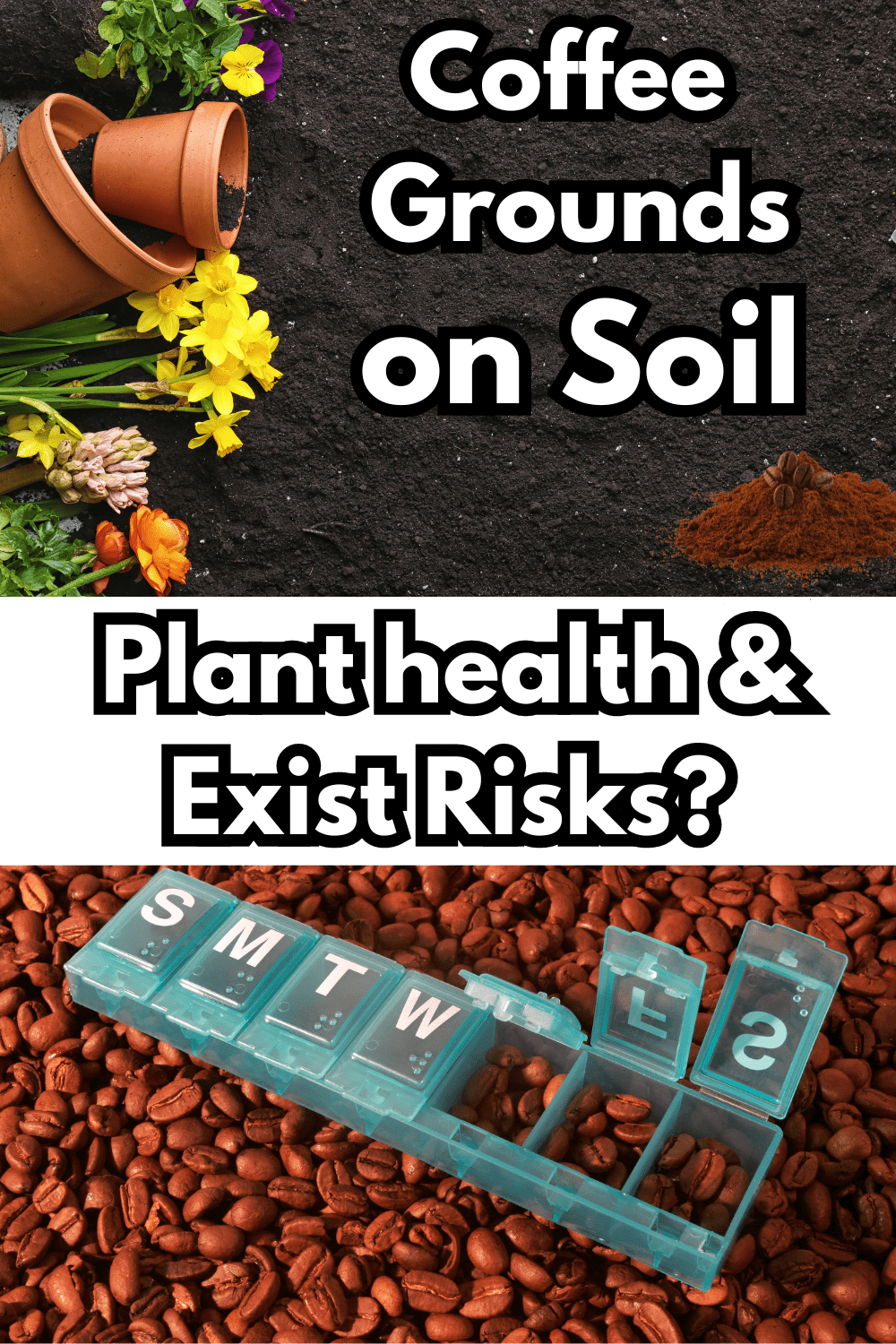
So, remember to only spread it lightly across your soil.
Dangers of Caffeine for Pets
It is necessary that you keep your pets such as dog and cats away from the coffee grounds. Due to the caffeine content in the coffee grounds, it is not advisable for your pets get closer, because even stepping on it is common for these pets to lick their paws and become contaminated may lead them to some serious health issues such as:
- Increased Heart Rate: Caffeine can cause a rapid heartbeat.
- Vomiting and Diarrhea: Pets may experience gastrointestinal distress.
- Tremors and Seizures: High doses of caffeine can cause nervous system problems.
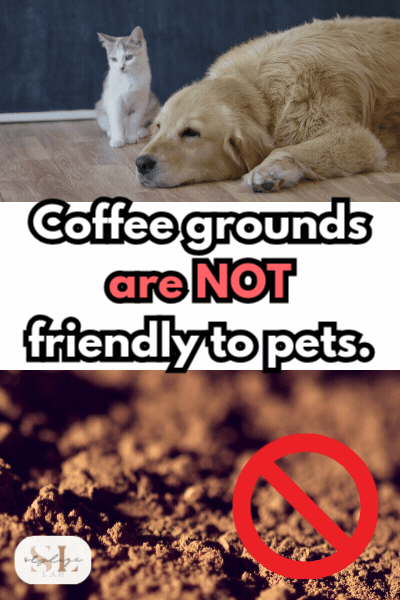
How to Keep Pets Safe
- Avoid Direct Application: Don’t sprinkle coffee grounds in areas where pets can easily access them.
- Leach Caffeine: Ensure the grounds have been watered multiple times to leach out the caffeine before use.
- Use Compost: The safest method is to add coffee grounds to your compost heap, where the harmful components will break down.
Contaminants
Used coffee grounds may contain various contaminants, which can pose risks:
- Chemical Residues: Non organic coffee is subjected to chemical processing including the use of pesticides and herbicides. The residues are likely to span in the soil pore spaces, thereby influencing the soil’s health and quality. You can minimise this risk by using the organic coffee grounds.
- Acrylamide: This compound is formed in the roasting process, and it is a potential toxin to humans (though this has not been conclusively). Coffee grounds pose unknown risks to soil and plants, so it is best not to use them heavily and combined with other organic matter to minimise potential contaminants.
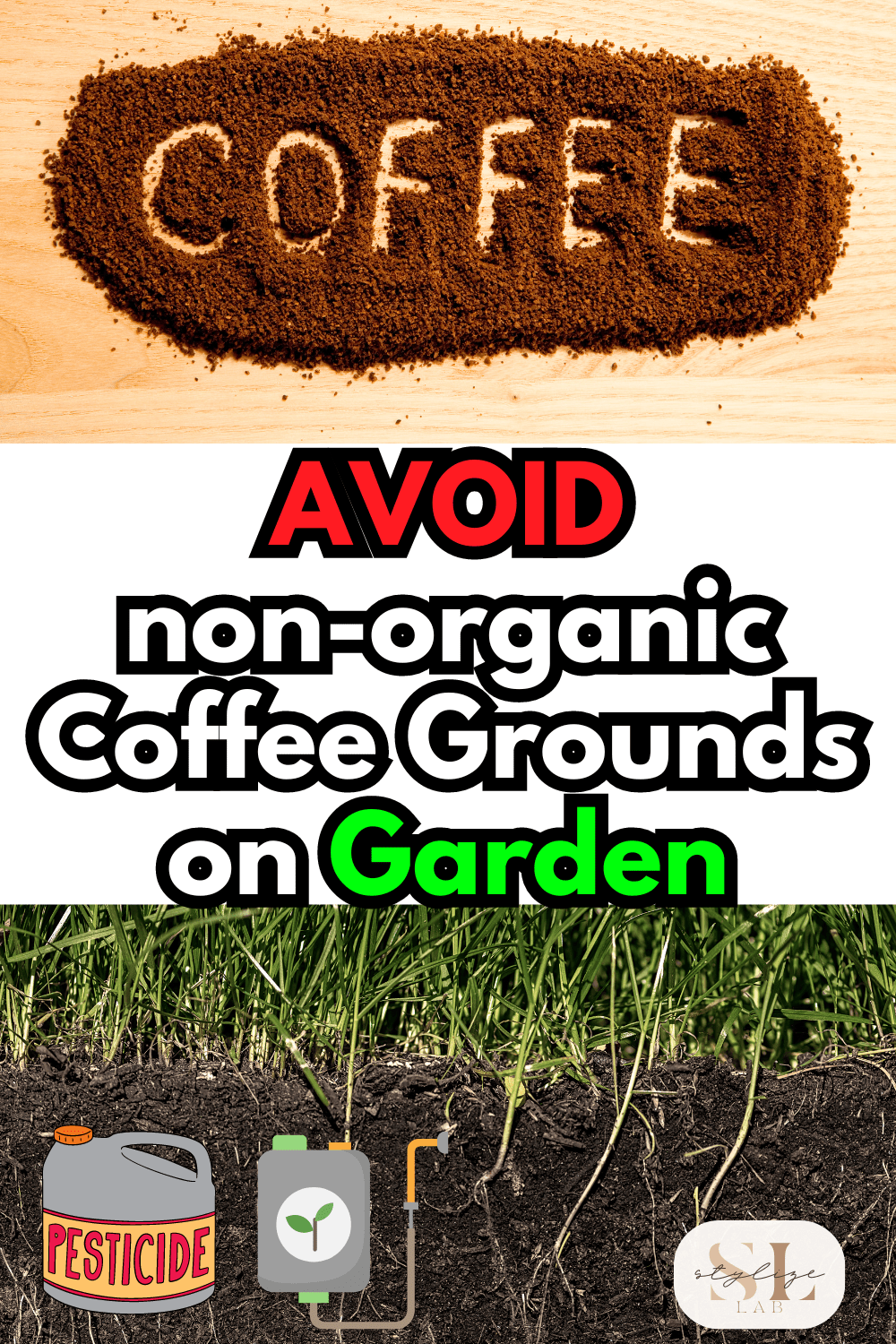
- Heavy Metals: Most studies find small amounts of heavy metals such as copper and zinc in the coffee grounds. These are generally present in small enough amounts that they probably have no practical health impact from using them. Over a long period of time, however, their accumulation in the soil could become more significant.
Summary
Weeding out the myths and closely examining the science will empower gardeners to use coffee grounds as a soil amendment and a pest control method more effectively and safely.
As with any asset, while coffee grounds and their uses are advantageous, it’s wise to know potential risks to gain a proper perspective on the sustainable use of the material.
In the end, the tip I give is to use it moderately, in compost, well mixed, you will be happy!
Sprinkling a little on the soil is also beneficial, and your plants will thank you.🌱
FAQ: Coffee Grounds in the Garden
Are used coffee grounds too acidic for my garden?
Not quite – used coffee grounds usually have a pH of around 6.5-6.8 which is near-neutral and good for most plants. Fresh grounds are more acidic, so don’t use fresh ones.
How often should I apply coffee grounds to my garden?
Apply used coffee grounds every 1 to 2 months during the growing season. Always use them in moderation and mix them with other organic materials.
Can coffee grounds be used as a fertilizer substitute?
Not at all; coffee grounds are not a complete fertiliser that has a balanced nutrient profile. They might have some nitrogen and other properties. So use them as a supplement to other fertilisers.
Do coffee grounds repel pests?
Placed around the base of plants, coffee grounds might deter some pests, such as slugs, snails and even ants, but results are inconsistent.
Will coffee grounds harm my plants?
Used in moderation, coffee grounds are unlikely to harm plants. Overuse, however, can affect soil pH and nutrient balance, so it’s crucial to apply them carefully.
Can I add coffee grounds directly to my compost bin?
Yeah – coffee grounds are a great addition to compost bins, as they contain nitrogen and can help balance the amount of green compost material (like vegetables) with brown compost material.
Are there risks associated with using non-organic coffee grounds?
While non-organic coffee grounds can contain, among other things, residues of chemical pesticides and herbicides, using organic grounds can reduce this risk.
Should I rinse coffee grounds before using them in my garden?
Generally, they don’t need to be rinsed. They’re probably safe to use just as they are, but mixed with other compost materials.
Can coffee grounds enhance soil acidity for acid-loving plants?
Yes, coffee grounds can slightly raise soil acidity, so if you have acid-loving plants, such as blueberries, azaleas or roses, tossing your grounds on the soil or compost pile can help. Just keep tabs on soil pH.
Are coffee grounds good for worm composting?
Absolutely. Coffee grounds attract worms and provide them with good nutrients, improving efficiency.
Conclusion
Coffee grounds are a sustainable no-cost soil amendment that you can use to give your plants a boost, improve your compost, and deter pests.
There are a number of ways to put those grounds to use. Use them on your garden when you are planting vegetables, tuck them into your compost pile or bin, and spread them around to trick pests.
With these tips and techniques, you’ll learn how to make the most use out of your garden coffee grounds so that you can see your plants thrive.
If you combine the coffee grounds with your gardening plans, you’ll be not only recycling waste but also beautifying your garden and making it more productive.

